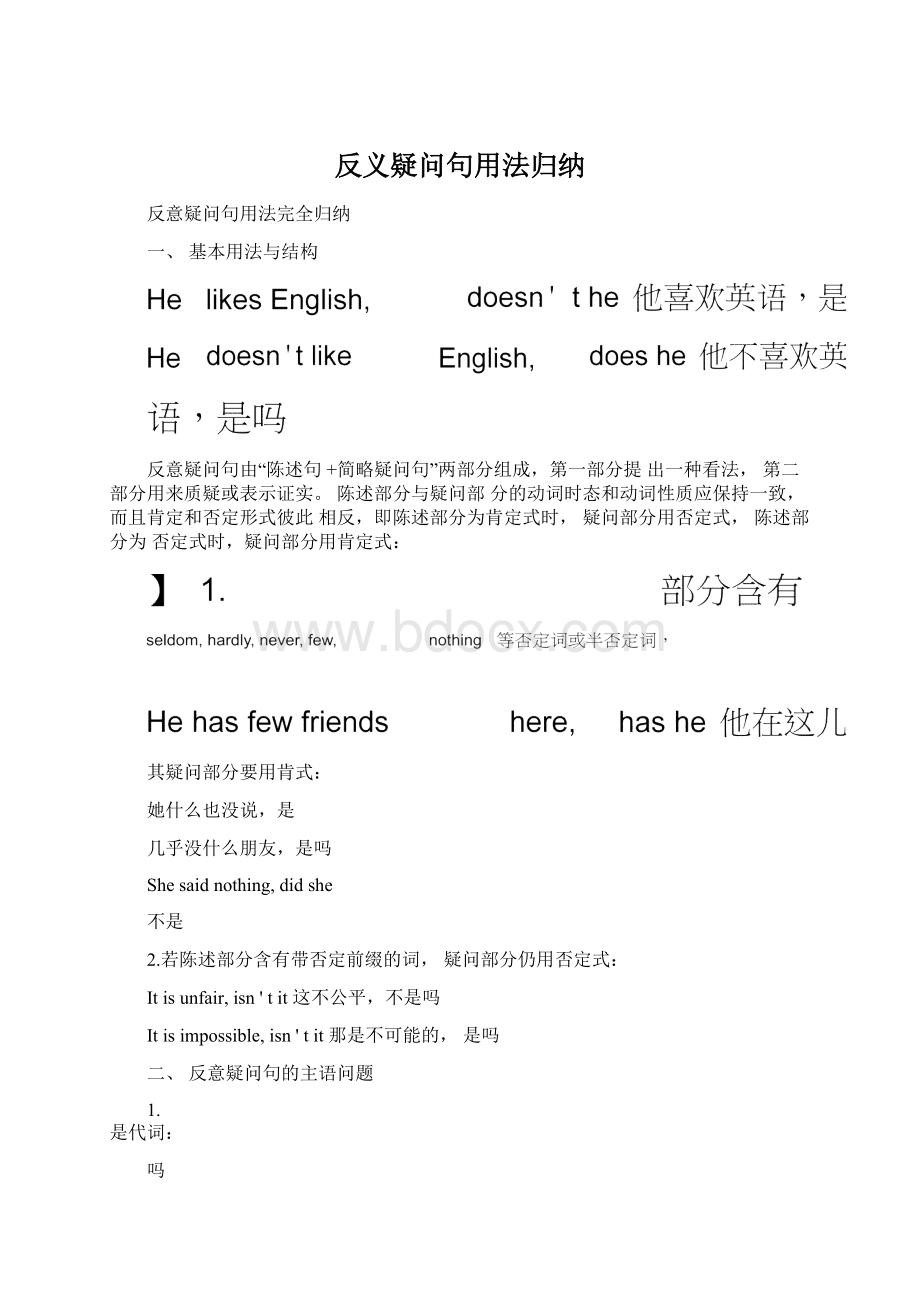反义疑问句用法归纳Word文档下载推荐.docx
《反义疑问句用法归纳Word文档下载推荐.docx》由会员分享,可在线阅读,更多相关《反义疑问句用法归纳Word文档下载推荐.docx(12页珍藏版)》请在冰豆网上搜索。

5.
当陈述
部
分
的主语
是
something,anything,
nothing,
everything等复合
不定代词时,其反意疑问句的主语要用it:
Everythingisready,isn'
tit一切都准备好了吗
Nothingisimportant,isit没有什么重要的,不是吗
三、陈述部分有动词have的反意疑问句
1.当have为助动词时,其反意疑问句沿用同样的助动词:
Hehasalreadyleft,hasn'
the他已经离
开了,是吗
2.当have为实意动词时,要分两种情况:
①若表示“所有”,反意疑问句可以用have,也可以用
do:
Hehasalotoffriendshere,hasn'
t[doesn'
t]he他在这儿有许多朋友,是吗
但是若陈述部分用的是have的否定式,反意疑问句用have还是用do,取决于陈述部分的动词形式:
Hehasn'
tanymoney,hashe他没有钱,是
Hedoesn'
thaveanymoney,doeshe他没有钱,是吗
②若表示“吃”、“玩”等意思,反意疑问句要用do:
Hehassupperat5,doesn'
the他5点吃晚餐,是吗
Hehadagoodtimeattheparty,didn'
t
he他在晚会上玩得很开心,是吗
3.当用于haveto时,通常也有两种可能:
若表示经常性的行为,则多用加助动词do的形式;
若表示特定的行为,则多用have:
Heoftenhastogetupearly,doesn'
the他经常要早起,是吗
Hehastogotobedlatetonight,hasn'
the他今晚要迟睡,是吗
四、含情态动词的反意疑问句
1.基本原则:
在通常情况下,当陈述部分含有情态动词时,疑问部分会重复前面同样的情态动词:
HecanspeakEnglish,can'
the他会说英语,是吗
Weshouldn'
tgo,shouldwe我们不应该去,对不对
2.当陈述部分含有must时,要分两种情况:
①若must表示“必须”或“有必要”,疑问部分用mustn'
t或needn'
t:
Youmustleaveatonce,mustn'
t[needn'
t]you你必须(有必要)马上离开,是吗
但是若陈述部分有mustn'
t表示禁止,疑问部分要must:
知道吗
②若must表示推测,疑问部分不能用must,而应根据must后的动词结构采用相应的动词形式:
Hemustbetired,isn'
the他一定累了,是吗
五、陈述部分为祈使句的反意疑问句
1.基本原则:
若陈述部分为祈使句,疑问部分通常用willyou:
Please
help
us,
will
you
请帮帮我们,好吗
Come
with
同我们一起去,好
Don'
t
forget
to
post
the
letter,willyou
请别忘了寄信。
2.当祈使句为Let'
s时,疑问部分总是用shallwe:
Let'
sgotheretogether,shallwe我们
起去,好吗
ssitunderthetree,shallwe咱
们就坐这树下吧,好不好
3.当祈使句为Letus,时,若表示请求,疑问部分用willyou,若表示建议,疑问部分用shallwe:
Letusknowyouraddress,willyou请把你的地址告诉我们,好吗
Letusgoswimmingtogether,shallwe我们一起去游泳好吗
六、陈述部分为主从复合句的反意疑问句
1.当陈述部分为主从复合句【主句+从句】时,疑问部分一般应与主句保持一致:
Hesaidthathedidn'
tlikeit,didn'
the他说他不喜欢它,是不是
HeknowswhereIlive,doesn'
the他知道我住什么地方,是不是
2.当陈述部分为Ithink(believe,suppose)that...等时,疑问部分通常与从句保持一致(注意否定的转移):
Ithinkthatitistooshort,isn'
tit我认为它太短了,对不对(它太短吗)
Idon'
tthinkhewillcome,willhe
我认为他不会来,对吗(他会来吗)
【注】这类用法主要限于主语为第一人称且think等动词为一般现在时的情形。
七、反意疑问句其他几种用法
1.当陈述部分是I'
m时,疑问部分通常用aren'
t:
I'
mwrong,aren'
t我错了,是吗
molderthanyou,aren'
t我年纪比
你大,对不对
2.当陈述部分是Iwish⋯时,疑问部分通常用mayI
Iwishtogowiththem,mayI我想同他们一起去,可以吗
3.当陈述部分有hadbetter时,疑问部分用had:
He'
dbetterleavehere,hadn'
the他最好离开这儿,是吗
4.
He
含有oughtto的反意疑问句,陈述部分是肯定的,疑问部分用shouldn'
t/oughtn'
t+主语。
oughttoknowwhattodo,oughtn'
th
e/shouldn'
the
他应该知道怎么做,不是吗
主语或usedn'
e/usedn'
用wouldn'
What
colours,
aren'
asmell,
isn'
it
9.陈述部分由neither,nor,either⋯or连接的并列
主语时,疑问部分根据其实际逻辑意义而定
NeitheryounorIamengineer,arewe
10.并列复合句疑问部分,谓语动词根据邻近从句的谓语而
Mr.SmithhadbeentoBeijingforseveraltimes,heshouldhavebeeninChinanow,
shouldn'
11.带情态动词dare或need的反意疑问句,疑问部分常
用need(dare
)
+主语。
Weneed
not
doitagain,
needwe
Hedare
sayso,dare
当dare,need为实义动词时,疑问部分用助动词do+主语。
Shedoesn'
tdaretogohomealone,doesshe
12.当陈述部分以one不定代词做主语时,附加问句的主语在正式常场用one,非正式场合用he。
13.
Oneshouldlearnfromothers,shouldn'
tone
/he
面的宾语从句一致
Each
hashis
strongpoints,
hasn'
/
doesn'
15.当
陈
述句的
主语
为
eachof
us,each
ofyou,each
ofthem时,
反
意疑问句的主语用we,
you,they。
hav
EachofthemhasanEnglishdictionary,
en'
tthey
16.当陈述句的主语为eachof⋯结构时,反意疑问句的主
语用he
she,
it强调个体,
用we,
you,
they强调
全体。
of
thesenovels
isto
be
discussed
thisterm,
isn'
Eachofushavegottheprize,haven'
twe
17.陈述句主语为such时,反意疑问句的主语单数用it,复数用they。
Suchishistrick,isn'
tit
Suchareyourexcuses,aren'
18.在"
noneof⋯"
结构中,如of后的名词或代词是单数,后面的主语也为单数,这种情况,主要由于of后的名词或代词为不可数名词.
Noneofitishere,isit
19.当陈述句部分是thereusedtobe⋯结构时,反意疑问句用wasn'
t(weren'
t)there。
Thereusedtobethreepinetreesinthe
yard,weren'
tthere
Thereusedtobeshopatthecornerofthestreet,wasn'
习题
一、构成形式:
“肯定的陈述部分+否定的附加疑问句“或”否定的
陈述部分+肯定的附加疑问句”
1.Sheisasinger,(2005年重庆)
A.
tshe
B.
she
C.isn'
(改
意
疑
问句
Melissa
gota
birthday
present.
(2005年四川)
Melissagotabirthdaypresent,
答案:
1.C2.Didn'
tshe二、反意疑问句的答语:
回答若为肯定句则前为“Yes”,若为否定
句则前用“No”。
如果前边的陈述句为否定句,其回答应“实事
求是”
1.—
Catsareasbigastigers,
aren
'
tthe
y—
2005年江苏南通)
Yes,
are
No
theya
ren'
C.
aren'
D.
No,t
heyare
2.—
You
go
swimmingthis
Saturday,won
tyou
—
___.I
have
workthisSaturday.
(20
05年四川省)
A.Yes,
Iwill
B.Yes,Iwon
C.No,Iwon'
B
C
三.陈述
句
中如有
否定
词
hardly,never,
few,
little,no,
nobody,
nowhe
re,nothing等时,
附加疑问句要用肯定形式
1.(
变
反意
问
MissKinghardly
spokeawordthewholetime.
Misskinghardly
spokeawordthewholetime,
答案
1.isthere2.canhe3.hashe4.didshe
四、陈述句中如有have时,须注意have若是实义动词,附加疑问句可用have形式,也可用do形式;
当陈述句中的have是助动词时,
附加疑问句要用do的适当形式
(
改
意疑
Bruce'
s
just
come
back
from
England.
Bruce'
sjust
England
D.didn'
Thereissomewaterinthebottle,isn'
A
六、陈述句如果是祈使句,附加疑问句常用willyou或won'
tyou等使语气变得委婉。
但以let'
s开头的祈使句,附加疑问句要用shallwe;
而以letus开头的祈使句则用willyou
1.—Let'
sgoandplayfootball,
—That'
swonderful.
won'
D.shallwe
改为反意
疑问
adiscussionabouti
t.
Let'
shaveadiscussion
aboutit
A.willyou
B.doyou
1.Dwe
特别提示
当陈述部分含有宾语从句时,附加疑问部分应与主句的主语和谓语动词保持对应关系。
但当陈述部分的主句是Ithink(believe/suppose)等结构时,附加疑问部分应与从句的主语和谓语动词保持对应关系,并注意否定转移。
如:
Petersays(that)Ididit,doesn'
the
Ithink(that)she'
sserious,isn'